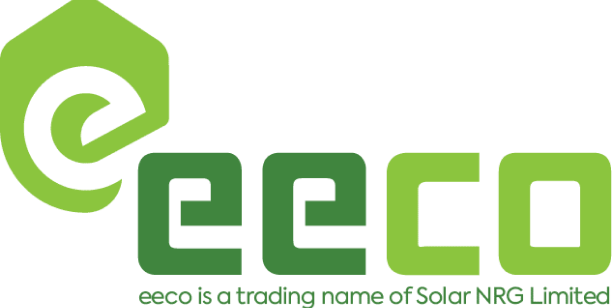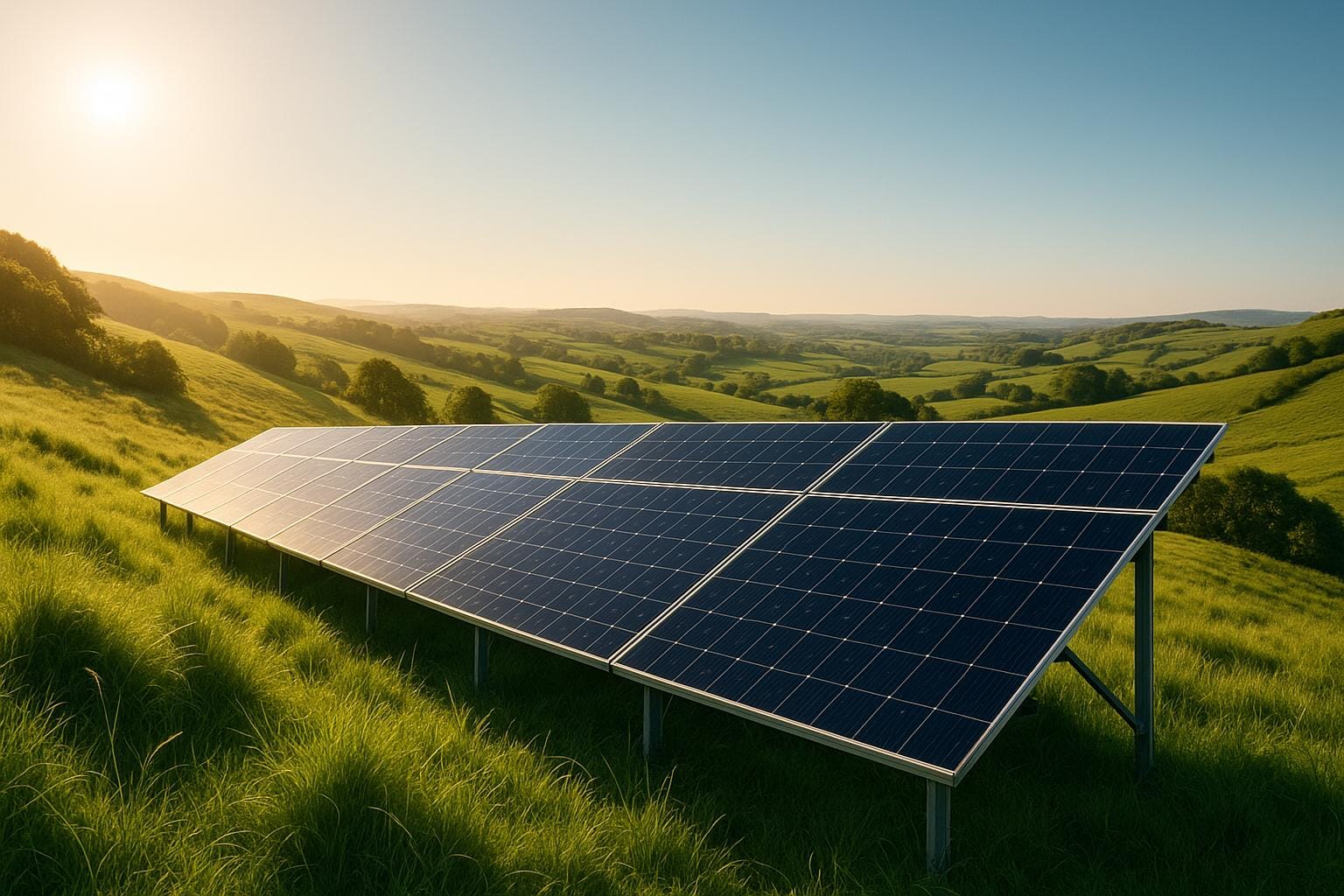Solar panels are one of the most effective ways to reduce carbon emissions. By generating electricity from sunlight instead of burning fossil fuels, they produce clean energy with zero direct emissions. In Northern Ireland, where much of the energy still comes from imported fossil fuels, switching to solar power helps reduce reliance on the grid, lowers household and business carbon footprints, and supports long-term energy security.
EECO system options & expected generation (NI)
Assumptions: South-facing array, all-black 450 W Tier-1 panels, 30-year warranty, 23.8% module efficiency, and 87% performance guarantee at year 30.
| System size (kW) | No. of panels | Expected annual generation (kWh) |
|---|---|---|
| 4.5 | 10 | 3,480 |
| 5.4 | 12 | 4,400 |
| 7.2 | 16 | 6,189 |
| 8.1 | 18 | 6,685 |
| 9.0 | 20 | 7,099 |
Real-world yield varies with shading, roof pitch, orientation, and local conditions. EECO designs each system to maximise generation on your property.
Key points
- Solar panels convert sunlight into electricity without emitting harmful gases.
- A typical 4 kW–4.5 kW residential system can save ~800 kg of CO₂ per year.
- Even in Northern Ireland’s cloudy weather, solar panels work efficiently using daylight, not just direct sunlight.
- Adding battery storage allows you to save excess energy for later use, further reducing reliance on fossil fuels.
- Over 25 years, solar panels can prevent the release of many tonnes of CO₂.
Switching to solar power is a practical step for homes and businesses to save on energy bills and contribute to a cleaner future.
Carbon Emissions in Northern Ireland: The Current Challenge
Northern Ireland faces pressing challenges in cutting down its carbon emissions, largely driven by reliance on fossil fuels. This highlights the growing importance of renewable energy solutions, such as solar power, in tackling the issue.
Main Sources of Carbon Emissions
Electricity generation is a major contributor, with many stations still relying on fossil fuels. Heating in rural areas often uses oil-fired boilers, adding further emissions. Transport, dominated by petrol and diesel vehicles, is another substantial factor. Commercial, industrial, and agricultural activity also contribute heavily, underscoring the need for rapid renewable adoption.
How Renewable Energy Supports Climate Goals
Solar power stands out as a clean, efficient alternative. By generating electricity without producing direct emissions, solar panels support the UK’s net-zero target for 2050. Storage and smart energy management further amplify the benefits by shifting clean energy into peak demand times.
In Northern Ireland, EECO Energy is at the forefront of adoption, helping homes and businesses gain energy independence while cutting carbon emissions.
How Solar Panels Create Clean Energy
PV technology uses silicon cells to convert sunlight directly into electricity. When light hits the cells, it dislodges electrons, creating current — with no combustion or waste. The inverter converts DC from panels into AC for your property. Surplus can be stored in batteries for later use or exported for income — and carbon savings.
Solar panel performance in NI weather
Panels generate from daylight (not just direct sun), so they still produce on overcast days. Cooler temperatures actually improve efficiency, and regular rainfall helps keep modules clean. Modern panels are engineered to withstand NI’s wind, rain, and occasional snow, maintaining reliable generation year-round.
Cutting Fossil Fuel Dependence
Every unit of solar electricity used on site displaces grid power that would otherwise come from fossil fuels. For example, a 4.5 kW EECO system (10 panels) generating ~3,480 kWh/year can prevent around 800 kg CO₂ annually. Larger commercial systems scale these savings dramatically.
EECO’s projects across NI combine battery storage and smart controls to maximise emissions reductions and on-site consumption.
Measuring Carbon Savings from Solar Panels
Comparing lifecycle emissions shows a clear advantage for solar:
- UK grid electricity: ~0.23 kg CO₂/kWh
- Solar PV (lifecycle): ~0.05 kg CO₂/kWh
- Net avoided per kWh: ~0.18 kg CO₂
A domestic 4–4.5 kW system (~3,500 kWh/year) therefore saves ~630–800 kg CO₂ each year. Over 25 years, that’s well over 15 tonnes avoided. For businesses, tens of thousands of kWh per year translate into multi-tonne annual reductions.
Boosting Carbon Reduction with Energy Efficiency
Add battery storage
Storing daytime solar for evening use deepens carbon cuts by avoiding higher-carbon grid imports. EECO offers scalable storage (e.g., 10 kWh class systems) to fit homes and businesses.
Smart energy management
Smart inverters, immersion controllers, and EV charging aligned to solar generation increase self-consumption and further reduce emissions.
Everyday efficiency
Run appliances during solar-rich hours, use LED lighting, and consider heat pumps (especially powerful when paired with solar) for substantial additional savings.
Solar Panel Benefits for Northern Ireland Properties
Lower energy bills and cost savings
A 4.5 kW (10-panel) system producing ~3,480 kWh/year can cover a large share of a home’s needs, reducing bills immediately. For larger demands, a 9 kW (20-panel) system generates ~7,099 kWh/year. With rising energy prices, many customers see attractive payback timelines — and decades of low-cost energy thereafter.
Export income: EECO customers can also earn for exported energy via our partnership with Action Renewables — complementing bill savings with ongoing payments.
Energy independence and security
Pairing solar with storage provides resilience during peak prices or outages and brings predictable, controllable energy costs.
Supporting NI’s green future
Beyond cutting carbon, solar boosts property value, strengthens the grid, and supports local jobs in a growing clean-energy sector.
Conclusion: Building a Cleaner Northern Ireland with Solar
Solar delivers immediate, measurable carbon reductions while improving energy affordability and security. With south-facing, all-black 450 W Tier-1 panels, 30-year warranty, 23.8% efficiency, and an 87% performance guarantee, EECO Energy designs systems that maximise generation and long-term value. Add storage and smart controls, and you’ll lock in deeper carbon cuts and bigger savings.
Ready to see what your roof can generate? EECO will model your property, specify the ideal system size (from 4.5 kW / 10 panels up to 9 kW / 20 panels and beyond), and handle everything from survey to optimisation — so you can start saving carbon and cash straight away.
FAQs
Can solar panels work effectively in Northern Ireland’s cloudy weather?
Yes. Panels harvest diffuse light and typically produce 10–25% of peak output on overcast days, with cooler temperatures helping efficiency. EECO systems are designed to perform in NI’s climate.
What are the financial advantages for NI homes and businesses?
Significant bill reductions from on-site generation, plus export income for surplus energy. EECO’s right-sized designs (e.g., 4.5 kW ≈ 3,480 kWh/yr, 9 kW ≈ 7,099 kWh/yr) help you hit the best return.
How does adding battery storage reduce carbon emissions?
Batteries shift clean solar into the evening — a higher-carbon period on the grid — cutting imports and emissions while increasing self-consumption of your own renewable power.
FAQs
Can solar panels still work effectively in Northern Ireland’s cloudy weather?
Yes, solar panels can perform well even in Northern Ireland’s cloudy weather. They are built to harness diffused sunlight, meaning they can still generate electricity on overcast days. Although their energy output is reduced compared to bright, sunny conditions, they typically operate at about 10% to 25% of their maximum capacity during such weather.
Interestingly, Northern Ireland’s cooler climate can actually benefit solar panels. High temperatures can lower their efficiency, so the milder conditions here help maintain consistent performance. Thanks to advancements in solar technology, these systems are designed to work effectively in a variety of weather conditions, making them a dependable energy option for both homes and businesses in the region.
What are the financial advantages of installing solar panels for homes and businesses in Northern Ireland?
Installing solar panels in Northern Ireland can lead to impressive savings. For an average household, the potential reduction in energy bills is about £513 annually, while businesses might enjoy even larger cuts. On top of that, VAT exemptions and grants can lower installation costs by £1,000–£1,500, making the switch to solar more budget-friendly.
Programmes like the Northern Ireland Sustainable Energy Programme (NISEP) offer grants that cover up to 20% of installation costs, easing the initial financial burden. These savings not only help reduce energy expenses but also contribute to cleaner energy use and increased energy independence.
How does adding battery storage to a solar panel system help reduce carbon emissions?
Adding a battery to your solar panel system can make a big difference in cutting carbon emissions. How? By storing extra solar energy during the day, you can use it later – like at night or when the sky’s overcast. This means relying less on grid electricity, which often comes from fossil fuels, and making the most of clean, renewable power.
Switching to stored solar energy instead of drawing from the grid helps households and businesses reduce their greenhouse gas emissions. It’s a step towards lowering your carbon footprint while promoting a greener, more energy-independent future.


